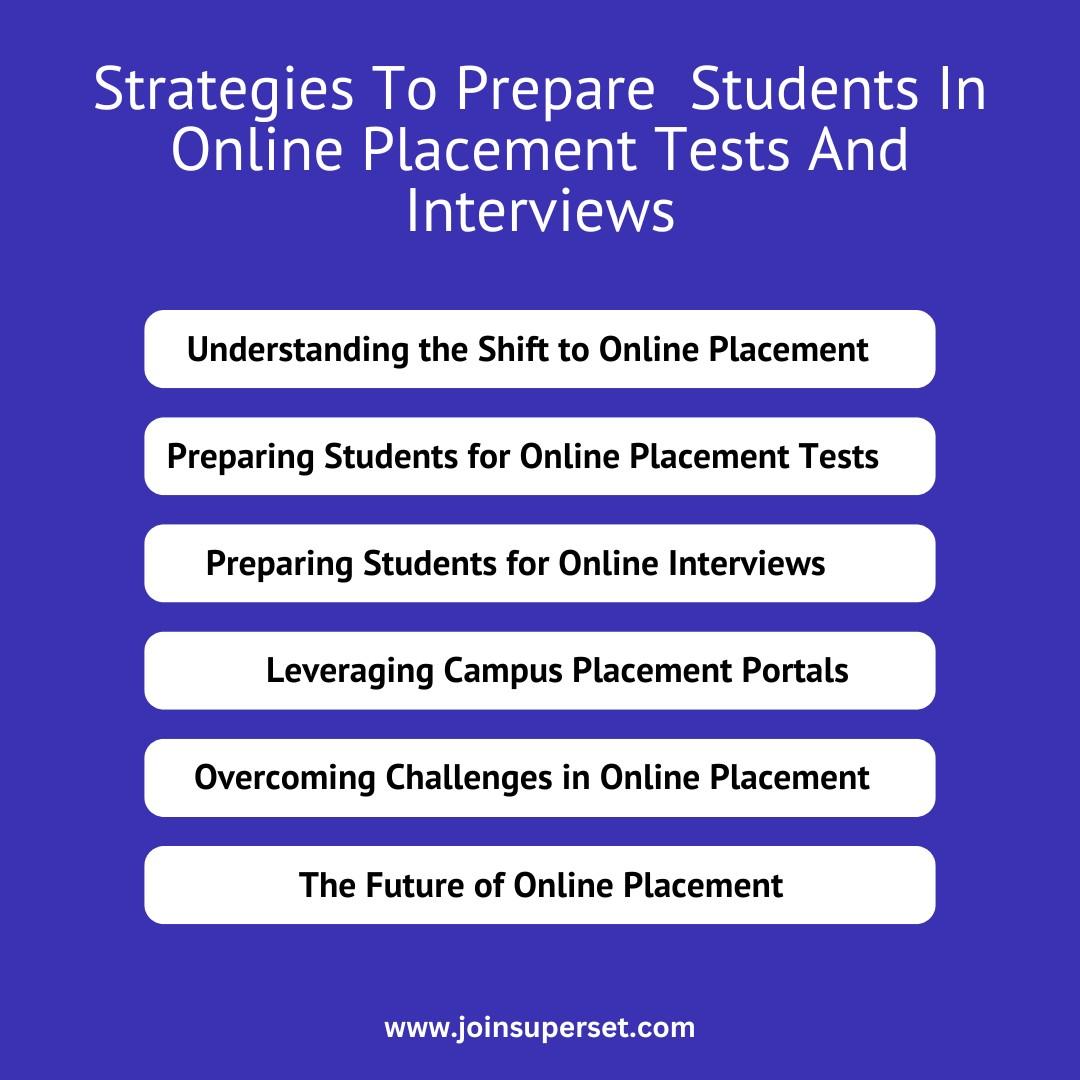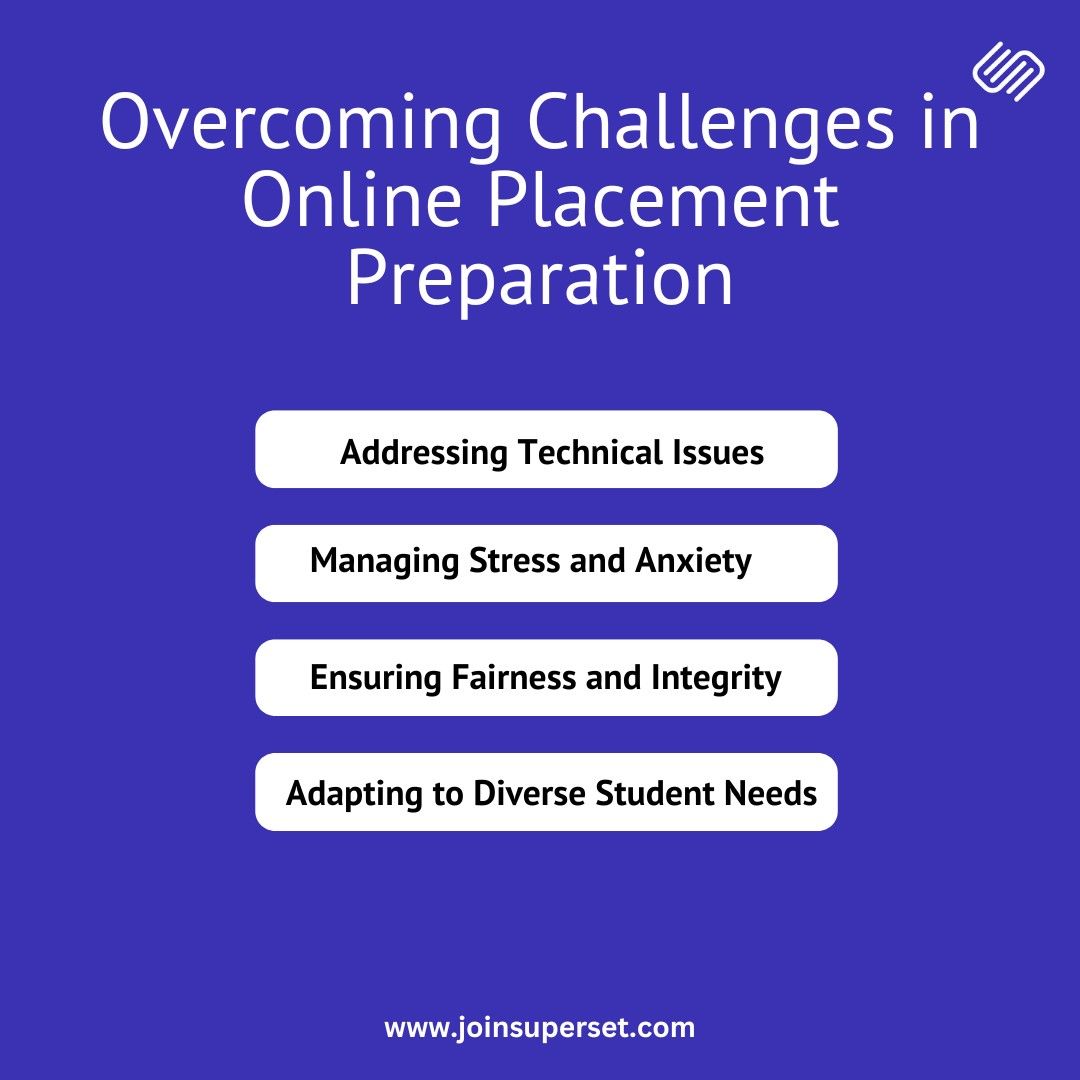In today’s rapidly evolving job market, the landscape of campus placements has undergone a significant transformation, with a clear shift towards digital platforms. As a university and placement officer, your role is pivotal in ensuring students are well-prepared for these online placements, where tests and interviews are conducted in virtual environments. This comprehensive guide will equip you with strategies, best practices, and insights to prepare your students for success in online placement tests and interviews.

1. Understanding the Shift to Online Placement
Online placement has become the new norm, driven by advancements in technology and the increasing need for accessibility. Traditional campus placements, which involved physical interactions and on-campus activities, are now being supplemented or even replaced by online campus drives. This shift has not only broadened the reach of campus placements but has also introduced new challenges and opportunities.
1.1 The Role of Online Campus Drives
Online campus drives allow companies to recruit students from multiple institutions without the need for physical presence, thus saving time and resources. For universities, this means expanding their network of potential employers and offering students a wider array of opportunities. However, it also requires a robust digital infrastructure and thorough preparation to ensure smooth execution.
1.2 The Need for Campus Placement Digitisation
The digitisation of campus placement processes is crucial in this new era. From registration and application submission to conducting tests and interviews, every aspect of the placement process is now digitized. This digitisation not only streamlines the process but also provides valuable data that can be used to improve future placement drives. Universities must invest in reliable campus placement portals to manage these processes efficiently.
2. Preparing Students for Online Placement Tests
Online placement tests are a critical component of the recruitment process, often serving as the first hurdle that students must overcome. Preparing students for these tests requires a multifaceted approach, combining academic preparation with technical readiness.
2.1 Familiarizing Students with the Online Testing Environment
One of the primary challenges of online placement tests is the unfamiliarity of the digital environment. Unlike traditional pen-and-paper exams, online tests require students to navigate digital platforms, manage time effectively, and stay focused without the physical presence of an invigilator. Universities should provide students with access to mock tests and practice sessions on the same platforms used by companies. This will help them become comfortable with the interface and functionalities, reducing anxiety on the day of the actual test.
2.2 Emphasizing the Importance of Technical Readiness
Technical glitches during online campus drives can be detrimental to students’ performance. To mitigate this, universities should ensure that students are well-equipped with the necessary hardware, such as a reliable computer, a stable internet connection, and essential software. Placement officers can organize workshops or provide guidelines on optimizing the technical setup for online placement tests.
2.3 Strengthening Aptitude and Technical Skills
Most online placement tests assess students on their aptitude, reasoning, and domain-specific knowledge. Universities should offer targeted training programs to enhance these skills. Regular practice sessions, online courses, and access to question banks can be highly beneficial. Additionally, universities can collaborate with companies to understand the specific requirements of their tests and tailor the training accordingly.
2.4 Managing Time Effectively During Online Tests
Time management is crucial in online placement tests, where students must complete a series of questions within a limited time frame. Universities can help students develop effective time management strategies by conducting timed mock tests and teaching techniques like quick problem-solving and prioritization. Placement officers should emphasize the importance of pacing oneself during the test to ensure that all questions are attempted.
2.5 Preparing for Different Types of Online Tests
Different companies use various formats for their online placement tests, including multiple-choice questions, coding challenges, case studies, and psychometric tests. Universities should expose students to these different formats and provide resources for preparation. Understanding the structure and expectations of each test type will give students a significant advantage.
3. Preparing Students for Online Interviews
Online interviews are the final and often most crucial stage of the online placement process. Preparing students for these interviews requires a combination of soft skills training, technical preparation, and familiarization with the online format.
3.1 Conducting Mock Interviews
Mock interviews are one of the most effective ways to prepare students for online placement interviews. Placement officers can simulate the interview environment, complete with the same platform and tools used by companies. This not only helps students get comfortable with the digital format but also allows them to practice answering questions confidently. Feedback from these mock interviews can be invaluable in helping students improve their performance.
3.2 Enhancing Communication and Presentation Skills
Communication skills are critical in an online interview setting, where non-verbal cues are limited, and clarity is paramount. Universities should offer training sessions on effective communication, focusing on clear articulation, active listening, and professional body language. Additionally, students should be coached on how to present themselves confidently on camera, including tips on eye contact, posture, and dress code.
3.3 Technical Setup for Online Interviews
Just as with online placement tests, the technical setup is crucial for online interviews. Placement officers should ensure that students have access to a quiet, well-lit space, a good-quality webcam, and a reliable microphone. They should also be trained on using the interview platform, including features like screen sharing, which may be required during technical interviews.
3.4 Preparing for Different Types of Online Interviews
Online interviews can vary greatly depending on the role and the company. Some may be purely technical, focusing on problem-solving and coding skills, while others may be behavioural, assessing a candidate’s fit within the company culture. Universities should provide resources and training for both types, ensuring that students are well-prepared for any scenario.
3.5 Building a Strong Online Presence
In the digital age, a student’s online presence can significantly impact their chances of success in campus placements. Placement officers should encourage students to build professional profiles on platforms like LinkedIn, where recruiters often search for potential candidates. A well-curated online presence can complement a strong performance in tests and interviews, making a student more attractive to employers.
4. Leveraging Campus Placement Portals
Campus placement portals play a central role in the modern recruitment process, serving as the primary platform for managing the entire placement cycle. From student registration and application tracking to conducting tests and scheduling interviews, these portals offer a comprehensive solution for campus placement digitisation.
4.1 Selecting the Right Campus Placement Portal
Universities must choose a campus placement portal that meets their specific needs. Key features to look for include user-friendliness, integration capabilities with existing systems, and support for online tests and interviews. The portal should also provide analytics and reporting tools to track placement performance and identify areas for improvement.
4.2 Training Students and Staff on Using the Portal
To maximize the benefits of a campus placement portal, both students and staff must be well-versed in its functionalities. Universities should conduct training sessions to ensure that everyone is comfortable navigating the platform. Placement officers can also create guides or FAQs to assist students with common issues they might encounter.
4.3 Streamlining the Application Process
A significant advantage of campus placement portals is the ability to streamline the application process. Students can easily apply for multiple companies, track their application status, and receive updates in real-time. Placement officers should guide students on how to make the best use of these features, ensuring that they don’t miss out on any opportunities.
4.4 Enhancing Engagement with Companies
Campus placement portals also facilitate better engagement with recruiting companies. Placement officers can use the portal to manage employer relationships, schedule online campus drives, and communicate with recruiters. A well-maintained portal can enhance the university’s reputation and attract more companies to participate in campus placements.
4.5 Utilizing Data and Analytics
The data generated by campus placement portals can provide valuable insights into the effectiveness of the placement process. Universities can analyze this data to identify trends, measure student performance, and make informed decisions about future placements. Placement officers should regularly review portal analytics to optimize their strategies and improve outcomes.
5. Overcoming Challenges in Online Placement Preparation
While online placement offers numerous benefits, it also presents unique challenges that universities and placement officers must address to ensure student success.

5.1 Addressing Technical Issues
Technical difficulties, such as internet connectivity problems or software malfunctions, can disrupt the placement process. Universities should have contingency plans in place, such as backup internet options and technical support teams, to assist students during online campus drives.
5.2 Managing Stress and Anxiety
The virtual nature of online placement tests and interviews can be intimidating for students, leading to increased stress and anxiety. Placement officers should provide mental health support and stress management resources to help students cope with these challenges. Encouraging a positive mindset and providing reassurance can go a long way in boosting student confidence.
5.3 Ensuring Fairness and Integrity
Maintaining fairness and integrity in online placement processes is a critical concern. Universities should implement strict guidelines to prevent cheating and ensure that all students have equal access to opportunities. This may include using proctoring software for tests, verifying student identities, and setting clear rules for conduct during interviews.
5.4 Adapting to Diverse Student Needs
Not all students have the same access to technology or the same level of digital literacy. Universities must be mindful of these disparities and take steps to support students who may be at a disadvantage. This could involve providing access to necessary equipment, offering additional training, or creating alternative arrangements for those with special needs.
6. The Future of Online Placement
As campus placements continue to evolve, online placement is likely to play an increasingly important role. Universities and placement officers must stay ahead of the curve by continuously adapting their strategies and embracing new technologies.
6.1 Embracing Continuous Learning and Adaptation
The field of online placement is constantly evolving, with new tools and best practices emerging regularly. Universities should foster a culture of continuous learning, where placement officers are encouraged to stay updated on the latest trends and technologies. This can be achieved through professional development programs, industry conferences, and networking with peers.
6.2 Expanding the Scope of Campus Placements
The digital nature of online campus drives opens up new possibilities for expanding the scope of campus placements. Universities can now connect with companies from across the globe, offering students opportunities that were previously out of reach. Placement officers should actively seek out international partnerships and explore new industries to broaden the range of placements available to students.
6.3 Leveraging AI and Automation
The integration of AI and automation into campus placement digitisation is already underway, with many universities using these technologies to enhance the efficiency and effectiveness of their placement processes. From AI-driven matching algorithms to automated interview scheduling, these tools can significantly reduce the administrative burden on placement officers and improve the overall experience for students.
7. Conclusion: Empowering Students for Success in Online Placements
Preparing students for online placement tests and interviews is a multifaceted task that requires a combination of technical readiness, skill development, and strategic use of digital tools. By following the strategies outlined in this guide, universities and placement officers can ensure their students are well-equipped to succeed in the evolving landscape of campus placements. The shift towards campus placement digitisation is not just a trend but a fundamental change in how recruitment is conducted. Embracing this change, investing in the right technologies, and providing comprehensive support to students will position your university as a leader in the digital age of campus recruitment. By empowering students with the knowledge, skills, and resources they need, you can help them navigate the challenges of online placement and confidently secure their future careers.








